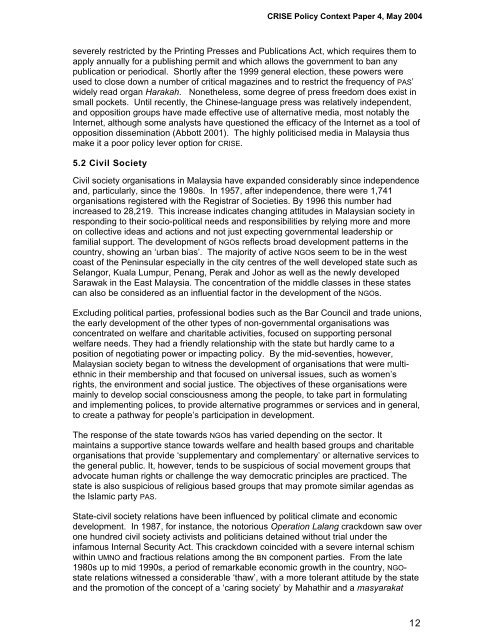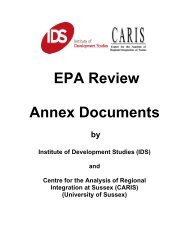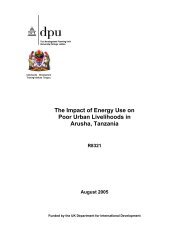Policy Levers in Malaysia - Department of International ...
Policy Levers in Malaysia - Department of International ...
Policy Levers in Malaysia - Department of International ...
You also want an ePaper? Increase the reach of your titles
YUMPU automatically turns print PDFs into web optimized ePapers that Google loves.
CRISE <strong>Policy</strong> Context Paper 4, May 2004<br />
severely restricted by the Pr<strong>in</strong>t<strong>in</strong>g Presses and Publications Act, which requires them to<br />
apply annually for a publish<strong>in</strong>g permit and which allows the government to ban any<br />
publication or periodical. Shortly after the 1999 general election, these powers were<br />
used to close down a number <strong>of</strong> critical magaz<strong>in</strong>es and to restrict the frequency <strong>of</strong> PAS’<br />
widely read organ Harakah. Nonetheless, some degree <strong>of</strong> press freedom does exist <strong>in</strong><br />
small pockets. Until recently, the Ch<strong>in</strong>ese-language press was relatively <strong>in</strong>dependent,<br />
and opposition groups have made effective use <strong>of</strong> alternative media, most notably the<br />
Internet, although some analysts have questioned the efficacy <strong>of</strong> the Internet as a tool <strong>of</strong><br />
opposition dissem<strong>in</strong>ation (Abbott 2001). The highly politicised media <strong>in</strong> <strong>Malaysia</strong> thus<br />
make it a poor policy lever option for CRISE.<br />
5.2 Civil Society<br />
Civil society organisations <strong>in</strong> <strong>Malaysia</strong> have expanded considerably s<strong>in</strong>ce <strong>in</strong>dependence<br />
and, particularly, s<strong>in</strong>ce the 1980s. In 1957, after <strong>in</strong>dependence, there were 1,741<br />
organisations registered with the Registrar <strong>of</strong> Societies. By 1996 this number had<br />
<strong>in</strong>creased to 28,219. This <strong>in</strong>crease <strong>in</strong>dicates chang<strong>in</strong>g attitudes <strong>in</strong> <strong>Malaysia</strong>n society <strong>in</strong><br />
respond<strong>in</strong>g to their socio-political needs and responsibilities by rely<strong>in</strong>g more and more<br />
on collective ideas and actions and not just expect<strong>in</strong>g governmental leadership or<br />
familial support. The development <strong>of</strong> NGOs reflects broad development patterns <strong>in</strong> the<br />
country, show<strong>in</strong>g an ‘urban bias’. The majority <strong>of</strong> active NGOs seem to be <strong>in</strong> the west<br />
coast <strong>of</strong> the Pen<strong>in</strong>sular especially <strong>in</strong> the city centres <strong>of</strong> the well developed state such as<br />
Selangor, Kuala Lumpur, Penang, Perak and Johor as well as the newly developed<br />
Sarawak <strong>in</strong> the East <strong>Malaysia</strong>. The concentration <strong>of</strong> the middle classes <strong>in</strong> these states<br />
can also be considered as an <strong>in</strong>fluential factor <strong>in</strong> the development <strong>of</strong> the NGOs.<br />
Exclud<strong>in</strong>g political parties, pr<strong>of</strong>essional bodies such as the Bar Council and trade unions,<br />
the early development <strong>of</strong> the other types <strong>of</strong> non-governmental organisations was<br />
concentrated on welfare and charitable activities, focused on support<strong>in</strong>g personal<br />
welfare needs. They had a friendly relationship with the state but hardly came to a<br />
position <strong>of</strong> negotiat<strong>in</strong>g power or impact<strong>in</strong>g policy. By the mid-seventies, however,<br />
<strong>Malaysia</strong>n society began to witness the development <strong>of</strong> organisations that were multiethnic<br />
<strong>in</strong> their membership and that focused on universal issues, such as women’s<br />
rights, the environment and social justice. The objectives <strong>of</strong> these organisations were<br />
ma<strong>in</strong>ly to develop social consciousness among the people, to take part <strong>in</strong> formulat<strong>in</strong>g<br />
and implement<strong>in</strong>g polices, to provide alternative programmes or services and <strong>in</strong> general,<br />
to create a pathway for people’s participation <strong>in</strong> development.<br />
The response <strong>of</strong> the state towards NGOs has varied depend<strong>in</strong>g on the sector. It<br />
ma<strong>in</strong>ta<strong>in</strong>s a supportive stance towards welfare and health based groups and charitable<br />
organisations that provide ‘supplementary and complementary’ or alternative services to<br />
the general public. It, however, tends to be suspicious <strong>of</strong> social movement groups that<br />
advocate human rights or challenge the way democratic pr<strong>in</strong>ciples are practiced. The<br />
state is also suspicious <strong>of</strong> religious based groups that may promote similar agendas as<br />
the Islamic party PAS.<br />
State-civil society relations have been <strong>in</strong>fluenced by political climate and economic<br />
development. In 1987, for <strong>in</strong>stance, the notorious Operation Lalang crackdown saw over<br />
one hundred civil society activists and politicians deta<strong>in</strong>ed without trial under the<br />
<strong>in</strong>famous Internal Security Act. This crackdown co<strong>in</strong>cided with a severe <strong>in</strong>ternal schism<br />
with<strong>in</strong> UMNO and fractious relations among the BN component parties. From the late<br />
1980s up to mid 1990s, a period <strong>of</strong> remarkable economic growth <strong>in</strong> the country, NGOstate<br />
relations witnessed a considerable ‘thaw’, with a more tolerant attitude by the state<br />
and the promotion <strong>of</strong> the concept <strong>of</strong> a ‘car<strong>in</strong>g society’ by Mahathir and a masyarakat<br />
12
















